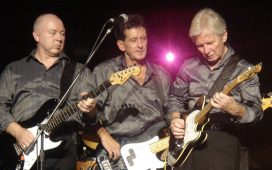20. Blew (1989)
Along with Mudhoney’s Sweet Young Thing Ain’t Sweet No More, Nirvana’s second single defined the initial sound of grunge: deeply unfashionable early-70s heavy rock refracted through a punk lens, where sludgy riffs met Ramones-ish third wall breaking (“here is another word that rhymes with shame”) and a coda so repetitious it sounded as if the record were stuck.
19. Territorial Pissings (1991)
An excoriation of machismo and sexism, Nirvana tended to launch into the Hüsker Dü-ish Territorial Pissings on TV shows where they were expected to play their new single: from the baby boomer-baiting strangulated verse of the Youngbloods’ Get Together that opens it to its frenetic screamed coda, it’s a glorious two fingers to the world.
18. Lithium (1991)
With the benefit of hindsight, perhaps it wasn’t so surprising that Nevermind – an album packing choruses as air-punch-inducing as Lithium’s cry of “yeah!” – became huge. Behind it, however, lurks an intriguingly equivocal song about the comforts of faith – not, it has to be said, a topic regularly addressed in the US post-punk underground whence Nirvana sprang.
17. Rape Me (1993)
It says something about Nirvana’s skill that swathes of In Utero deal with the usually dispiriting topic of a band complaining about their treatment by the press without slipping into sanctimonious Mr Writer-ish finger wagging. Rape Me is a case in point. It sounds both horrified and resigned: a man who, by all accounts, had been very ambitious cautioning to be careful what you wish for.
16. Sappy (1990-93)
Depending on your perspective, a song about Kurt Cobain’s pet turtle or an abusive relationship, Sappy was an outtake that deserved better, something Nirvana knew, playing it live for years and recording it over and over before defeatedly slipping it out as a hidden track on a charity compilation. A posthumous remix included on the deluxe version of In Utero reveals its melancholy potency.
15. Scentless Apprentice (1993)
The comedian Billy Connolly once opined that the words “go away” could never have the same impact as the words “fuck off”. He had clearly never heard the scourging din of Scentless Apprentice, on which Cobain’s agonised screaming of the seemingly innocuous phrase offers a deeply disturbing insight into the singer’s post-fame state of mind.
14. Polly (1991)
No song came to represent the gulf between Nirvana and some sections of their newfound audience quite as starkly as Polly, a horrifying depiction of a rape that ended up cited in an actual rape case: its perpetrators sang it to their victim. The song itself is stark and acoustic: it rams its subject matter in the listener’s face, rather than coating it in distortion and rock dynamics.

13. School (1989)
Given what happened to Cobain, there is an understandable tendency to look for angst throughout Nirvana’s catalogue. But they had a goofy sense of humour, at least at first: School’s power comes from the ridiculous level of import the music’s heaviness lends a lyric about getting a job as a janitor at your former alma mater, and envying the students’ break time.
12. Something in the Way (1991)
The title of Nevermind’s most poignant track turned the Beatles’ most ardent love song into a reference to an obstruction. Its lyrics offered the stark image of a homeless person dying, unnoticed, under a tarpaulin by a river, the music was hushed and haunting, Cobain’s voice barely rising above a murmur.
11. Been a Son (1989)
No one, least of all Nirvana themselves, could have predicted Nevermind’s success, but with hindsight, their early catalogue is sprinkled with suggestions that they were not the same as their grunge peers, among them the B-side Been a Son: a study of teenage alienation and gender that dispenses with the heaviness of Bleach in favour of a simple, relentless, unforgettable melody.
10. Drain You (1991)
Kurt Cobain claimed Drain You was the equal of “or better than” Smells Like Teen Spirit, and he had a point: another in his line of slightly warped love songs, it shifts from a sparkling verse to an extended, improvised and faintly psychedelic interlude, by way of squeaky toys and aerosols being sprayed, and ends with one of Cobain’s most startling screams. Dave Grohl compared it to Bohemian Rhapsody, which is perhaps pushing it a bit.
9. Dumb (1993)
Typically, In Utero’s calmest moment is a troubled paean to drugged-out indolence: the lyrics alternate between a kind of glassy-eyed transcendence and a fretful acknowledgment that the only time the narrator is happy is when they’re stoned, their gathering darkness scratching at the sweetness of the tune and the simplicity of the arrangement.
8. About a Girl (1989)
The highlight of debut album Bleach was a step away from the emotional terrain mined by, say, Nirvana’s Sub Pop labelmates Mudhoney: they tended to deal in hedonism and alienation, but About a Girl was a surprisingly sweet and earnest love song that betrayed Cobain’s love of tuneful-but-rickety British indie pop.
7. Where Did You Sleep Last Night? (1993, released 1994)
Nirvana were always catholic in their choice of covers, but an unexpected, desolate version of traditional folksong In the Pines is the most extraordinary, largely because of Cobain’s vocal, which begins as a faltering mumble and ends up operating at a level of emotional intensity that’s just shy of unbearable.
6. Aneurysm (1991)
Bafflingly relegated to B-side status, Aneurysm is every bit the equal of anything on Nevermind: a lyric that could be about blooming love or blossoming addiction, set to ferocious drumming and walls of noisy guitar, the harmony vocals on the coda fighting against the ongoing din. The live version from 1992’s Reading festival is particularly fraught and gripping.
5. Sliver (1990)
Nirvana’s improbable rise in a nutshell. Sliver was the first track that really pointed the way to Nevermind, a gleeful retelling of a childhood visit to Cobain’s grandparents in which throat-shredding vocals meet a glorious tune and Nirvana’s celebrated, Pixies-inspired quiet/loud dynamic. But it was meant as a joke, a “ridiculous pop song” recorded in an hour during labelmates Tad’s lunch break.
4. In Bloom (1991)
The success of Nevermind made the lyrics of In Bloom seem weirdly and entirely unintentionally prescient: meant as a portrait of Cobain’s friend Dylan Carlson, it ended up sounding like a howl of disgust at the more lumpen elements in Nirvana’s new audience. The chorus, meanwhile, is the perfect example of Cobain’s ability to conjure a simple but indelible melody.
3. Smells Like Teen Spirit (1991)
Overfamiliarity means it is hard to remember what an impact Teen Spirit had on release. In an era when major labels, big budgets and the quest for mainstream success almost invariably blunted an indie band’s power, Nirvana, incredibly, seemed to have been vastly potentiated by the move, honing their sound and their songwriting without losing their individuality. Plus they had come up with one of the all-time great riffs.
2. All Apologies (1993)
A heartbreaking counterpoint to the anguish and noise elsewhere on In Utero, All Apologies was written in 1990, but tellingly exhumed after Nirvana hit big. It feels acquiescent, defeated, the sound of a man crushed by fame. There’s no getting around the fact the lyrics read like a suicide note – “everything’s my fault” – although there is also a faint suggestion of a happier ending: “In the sun I feel as one.”
1. Heart-Shaped Box (1993)
In Utero is an album whose reputation precedes it: an unsettling farewell note from a doomed man at the end of his tether; a noisy, wilfully unpalatable screw-you to anyone who wanted Nevermind II, Nirvana’s horrified record company included. Those interpretations tend to overshadow the fact that it also represented a genuine musical progression. Heart-Shaped Box not only boasted one of Cobain’s most haunting melodies, and some of his most disturbing lyrics – for some reason, its famous declaration of love, “I wish I could eat your cancer when you turn black”, has yet to be co-opted by the makers of Valentine cards – but also developed the band’s trademark dynamic shifts: gradually ratcheting up the tension in the verses before the chorus explodes into jagged shards; nearly collapsing altogether after the guitar solo. Thrilling, white-knuckle listening.














